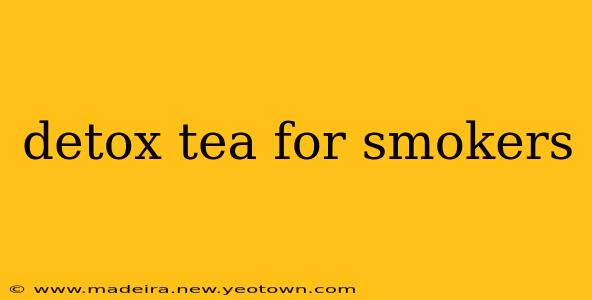For years, I’ve been fascinated by the power of natural remedies, especially when it comes to breaking free from harmful habits. When I started researching detox teas for smokers, I discovered a world of herbal infusions promising to cleanse the body and ease the transition away from cigarettes. But do these teas truly live up to the hype? Let's dive into the world of detox teas and explore whether they can genuinely aid smokers in their journey to a healthier lifestyle.
It's crucial to preface this by stating that detox teas are not a magic bullet. They won't magically eliminate nicotine from your system or cure the physical addiction. Quitting smoking requires a multifaceted approach, including professional support, nicotine replacement therapy, and a strong commitment to change. However, certain detox teas can offer supplementary benefits that may ease the withdrawal process and support overall well-being.
What are the Benefits of Detox Teas for Smokers?
Many detox teas contain herbs known for their potential to support detoxification processes within the body. These herbs can help flush out toxins, reduce inflammation, and boost the immune system – all factors relevant to smokers who are trying to repair the damage caused by years of smoking.
Some key herbs often found in detox teas for smokers include:
- Milk Thistle: Known for its liver-supporting properties, it may help the body process and eliminate toxins more efficiently.
- Burdock Root: Often included for its blood-purifying and detoxifying effects.
- Dandelion Root: A natural diuretic that can help the body eliminate excess water weight and potentially some toxins.
- Ginger: Can help soothe the digestive system, often upset during the quitting process.
How Can Detox Teas Support the Quitting Process?
While detox teas don't directly address nicotine addiction, their supportive benefits can make the transition smoother. Many smokers experience withdrawal symptoms like headaches, fatigue, irritability, and cravings. The gentle cleansing and soothing properties of some detox teas might help alleviate some of these symptoms.
What are the Common Ingredients in Detox Teas for Smokers?
Many detox teas specifically marketed to smokers often include a blend of herbs designed to support the body's natural cleansing processes. These blends can vary significantly, so always check the ingredients list to understand what you're consuming.
Are There Any Side Effects to Consider?
As with any herbal remedy, there's always a possibility of side effects. Some individuals may experience mild digestive discomfort, such as diarrhea or upset stomach. It’s essential to start with a small amount of tea and monitor your body's reaction.
If you have underlying health conditions, consult your doctor before incorporating detox teas into your routine, especially if you are taking medications. Interactions between herbal remedies and prescription drugs are possible.
Can Detox Teas Help with Nicotine Withdrawal?
While detox teas cannot directly remove nicotine from your system, some of the herbs may help alleviate some of the unpleasant symptoms of withdrawal. However, it’s crucial to remember that these teas are a supporting element and not a replacement for professional help and nicotine replacement therapies.
What are the Best Detox Teas for Smokers?
There's no single "best" detox tea. The effectiveness of a tea depends on individual factors and the specific blend of herbs. Look for teas that prominently feature herbs known for their detoxifying and soothing properties, like those listed above. Always read reviews and choose reputable brands.
What is the Best Way to Use Detox Tea for Smoking Cessation?
Ideally, use detox teas as a complementary support to a comprehensive smoking cessation plan. Combine them with professional help, nicotine replacement therapies, and lifestyle changes for the best results.
Disclaimer: This information is intended for educational purposes only and should not be considered medical advice. Quitting smoking is a significant undertaking and requires professional guidance. Consult your doctor or a qualified healthcare professional before making any changes to your health regimen, particularly if you are considering using herbal remedies. This information does not constitute medical advice and should not be used as a substitute for professional medical care.

